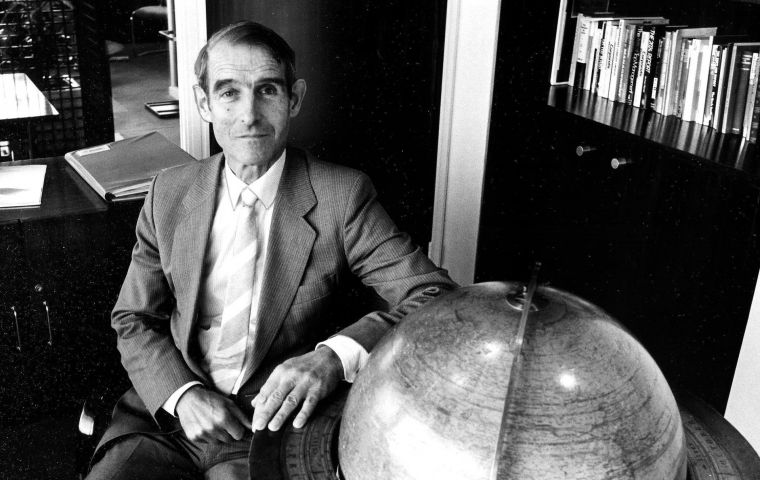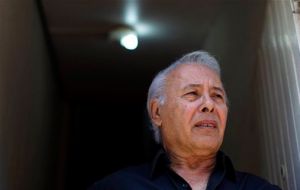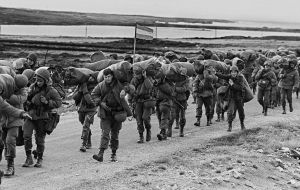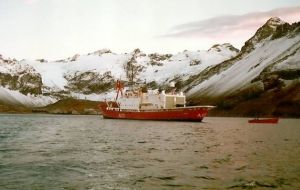MercoPress. South Atlantic News Agency
Falklands conflict: Sir Henry Greald Elliot, an involuntary trigger
 Gerald Elliot was head of Christian Salvesen when it signed a deal with Argentine scrap merchant Constantino Davidoff, to remove machinery from South Georgia.
Gerald Elliot was head of Christian Salvesen when it signed a deal with Argentine scrap merchant Constantino Davidoff, to remove machinery from South Georgia.  Davidoff arriving to begin in March 1982, Davidoff flouted the rules of doing business in the British Overseas territory
Davidoff arriving to begin in March 1982, Davidoff flouted the rules of doing business in the British Overseas territory  Davidoff came in an Argentine Navy ship, and landed not only his own men, but also Argentine marines. A larger ship followed, and the Argentine flag was raised.
Davidoff came in an Argentine Navy ship, and landed not only his own men, but also Argentine marines. A larger ship followed, and the Argentine flag was raised.  Sir Gerald maintained it was the withdrawal of the Royal Navy ice patrol vessel HMS Endurance in 1982, that opened the way to the Argentine military invasion
Sir Gerald maintained it was the withdrawal of the Royal Navy ice patrol vessel HMS Endurance in 1982, that opened the way to the Argentine military invasion Sir Gerald Henry Elliot, businessman and philanthropist died, 28 January 2018 in Edinburgh. Gerald Elliot was managing director, and later chairman, of the Edinburgh shipping company Christian Salvesen when it signed a deal with an Argentine scrap merchant, Constantino Davidoff, to have machinery removed from some disused whaling stations it had on the island of South Georgia.
Arriving to begin in March 1982, Davidoff flouted the rules of doing business in the British territory, a dependency of the Falkland Islands. He was supposed to give notice to the magistrate on the Island and to keep the Falklands Governor informed, but did neither. Instead he came in a ship of the Argentine Navy, and landed not only his own men, but also Argentine marines. A larger ship followed, with troops and equipment, and the Argentine flag was raised.
On 2 April, Argentina invaded the Falklands. It would be 20 years before Elliot spoke publicly of the events involving his company that led to the sending of the Task Force and Britain’s victory, and put the name of Christian Salvesen forever in the British official history of the Falklands War.
The Foreign Office had not welcomed the idea of Salvesen’s using an Argentine merchant for the job when the company mooted it in 1978, but neither had it objected, once details were explained. “We did not want our minor tidying operation to cause trouble”, Elliot, great- grandson of the company’s Norwegian-born founder, later wrote. The contract was for the sale to Davidoff of machinery from the stations at Leith Harbour, Stromness and Husvik, for £115,000.
“He was given three years to remove it”, Sir Gerald said of Davidoff, whom he considered “an innocent party” in the affair, a view also taken at the time by the British Foreign Office. He told The Scotsman in 2002: “It was quite difficult for him to find transport to get him there. There are no regular ships going down there, it’s the end of the world. He got pretty desperate so he went to the Argentine government.”
Sir Gerald maintained it was Britain’s withdrawal of the Royal Navy ice patrol vessel HMS Endurance in 1982, because of government cuts in defence funding, that opened the way to war with Argentina’s governing military junta led by General Leopoldo Galtieri.
Yet the scrap merchants’ behaviour had “all the trappings of a cunning plot”, Captain Nick Barker, Endurance’s commanding officer, said. It is not known whether Sir Gerald, a fluent Spanish speaker, conversed with Davidoff in person while making the deal. He was no stranger to South America and the South Atlantic, having spent four whaling seasons on South Georgia and having once shot a whale himself. He learned Spanish early in his 40-year career with the company while managing its fishmeal business in Peru. He was also fluent in Norwegian from stints spent in Norway, where Salvesen recruited much of its workforce, including the whaling ships’ highly skilled gunners.
A modest man with a razor-sharp intellect, Gerald Elliot rose to be managing director by 1973, and was chairman from 1981 until 1988. To the business he brought knowledge of economics, having studied Philosophy, Politics and Economics at New College, Oxford. He won a scholarship to Oxford in 1941 from school at Marlborough College in Wiltshire, but the Second World War delayed his going up until 1946.
The third of five children of a Royal Navy surgeon captain, Elliot served from 1942 for four years with the 13th Frontier Force Rifles in India, having chosen to join the Indian Army in the footsteps of his father’s brother, an army doctor and personal physician to the Viceroy, Lord Linlithgow. Elliot studied Urdu on the ship to India, and while stationed at Abbottabad reached First Class interpreter standard. He was selected for intelligence work, cracking codes and learning Japanese, but when invited also to learn Persian, asked not to continue: “I preferred the command of soldiers to intelligence work.”
He was promoted to Captain in charge of 8 Company D Battalion, but was not sent into battle. His descent from Christian Salvesen’s founder was through his mother, Magda, and he was cousin to Sir Maxwell Harper Gow – commando and Lord Lovat’s staff captain in Normandy on D-Day – who preceded him as company chairman.
At Oxford he met Margaret Whale, who was studying classics. They wed in 1950, and had three children: Jo, now a retired merchant banker; Katie, a textile artist; and Henry, a businessman. She and their children survive him. His siblings Marian, Ian, Christian and Stephen predeceased him. Elliot would be the last of an unbroken line of family chairmen of Salvesen from the company’s beginnings in Scotland in 1846. His first thoughts were of striking out on his own in law, diplomacy or politics, but an invitation in 1948 to join Salvesen from his uncle, the economist Captain Harold Salvesen, who was then chairman, proved irresistible.
He began as the chairman’s “bag-carrier”– minder of a large leather trunk on journeys across the globe that contained the company’s papers. Under Elliot’s own chairmanship Salvesen became Scotland’s largest private company, and was floated on the stock market in 1985.
Having pioneered refrigeration shipping as depletion of stocks from the 1960s heralded the end of commercial whaling, it went into North Sea drilling and food storage and delivery, and in 1984 acquired a power-generating business, Aggreko. Elliot was knighted in 1986. He retired in 1988.
There would be one more battle for Elliot, when he opposed the spinning off, in 1997, of Aggreko as a separate public company. This he lost. Christian Salvesen’s fortunes dipped in the 21st century, and in 2007 it was sold to the French logistics companyNorbert Dentressangle. The family retain interests in Aggreko.
He founded, in 1985, with the economist Sir Alan Peacock, a “think tank”, the David Hume Institute, and was a Fellow of the Royal Society of Edinburgh. He was Chairman of Scottish Opera from 1987-92, and a noted patron of Scotland’s arts. In 2012, with Lady Elliot, he was awarded the Prince of Wales Medal for Arts Philanthropy. A lifelong musician – at 18 he took his violin to India in a steel case to protect against the ravages of ants – he was still playing Bach, Vivaldi, and Scottish reels in retirement, as well as acquiring yet another language, Arabic.




Top Comments
Disclaimer & comment rules-

-

-

Read all commentsPgerman
Feb 19th, 2018 - 04:23 pm +9I’m sorry but there is no sovereignty problem with regards to the Falkland Islands except in the minds of nationalistic Argentines in as much as the Falkland Islanders, whether you like it or not are entitled to self-determination and they have made it abundantly clear via the referendum of a couple of years ago that they wish to retain their links with the UK
In what way are the Falkland Islands an ‘anachronism’?. In what way is it a ‘remnant of an Empire’ that Argentina’s claim of ‘inheritance’ from another ancient (and far more corrupt) empire is not? The people of the Falkland Islands are self-governing with the exception of Foreign Policy and Defence which they happily leave in the hands of the UK.
You do not have a shred of evidence to support your claim that ‘without the military and political support of the United Kingdom the current political status would not last a single minute’, that is pure wishful thinking on your part and in any case what makes you suppose that the UK will not continue to support them in exactly the same way that it supports the Isle of Man?
The Chagos Islands as a comparison to the Falkland Islands are, as you well know a ‘poisson rouge’ which has been discussed time and again on these threads.
There is no need to find a ‘creative’ solution to a problem that only exists in the minds of Argentine nationalists as part of their desired expansion of the Argentine South Atlantic Empire
It’s always the arrogance of Argentines that amazes me when they assume that there is a problem to solve and that they should hold the whip hand in solving it.
There isn’t a problem to solve and the future of the Falkland Islands has nothing whatsover to do with Argentina.
This is fascinating and long overdue information, we had the Argentine side from day one before the Falklands were invaded.
Feb 19th, 2018 - 11:01 am +8Anybody with any remote dealings or knowledge of Argentina must know that the minds of adults are “weaponised” from the time that they were 6 or 7 according to the ideas of General Perón, the fascist who studied under Mussolini and brought back to Argentina those methods of indoctrination. The 1955 revolution only took out the adoration of Peron and Evita (similar to Mussolini), but left all the rest of the doctrine “La Nueva Argentina de Perón”.
Argentina should be the most Anglophile country in the world, they even used to drive and the left and more or less applied to be part of the Empire, but all the British infrastructure and management was eradicated by the fascists in the 1940's decade, specially after 1946 when Peron came to power charting the downward course for Argentina from world power to the third world.
This fascist poison placed carefully in primary schools has been feeding back generation after generation since 1946 and now the indoctrinated indoctrinate the indoctrinated and demand more indoctrination (example: Malvinizar la historia), it is a dangerous feedback loop burning out Argentina. All the problems in the South Atlantic are in the class rooms of Buenos Aires and that is the only place where they can be resolved.
Pgerman
Feb 19th, 2018 - 05:50 pm +7It is clear that your perception of the Falklands/Malvinas is wrong. First of all, there should be no comparison between the Falkland Islanders and the former inhabitants of the Chagos
Islands - chalk and cheese!
The history of the Falklands archipelago is a British history whilst the Argentine history of the (so called) Malvinas is nothing more than fairy stories, lies, and misunderstandings and misapplications of historial events.
Commenting for this story is now closed.
If you have a Facebook account, become a fan and comment on our Facebook Page!